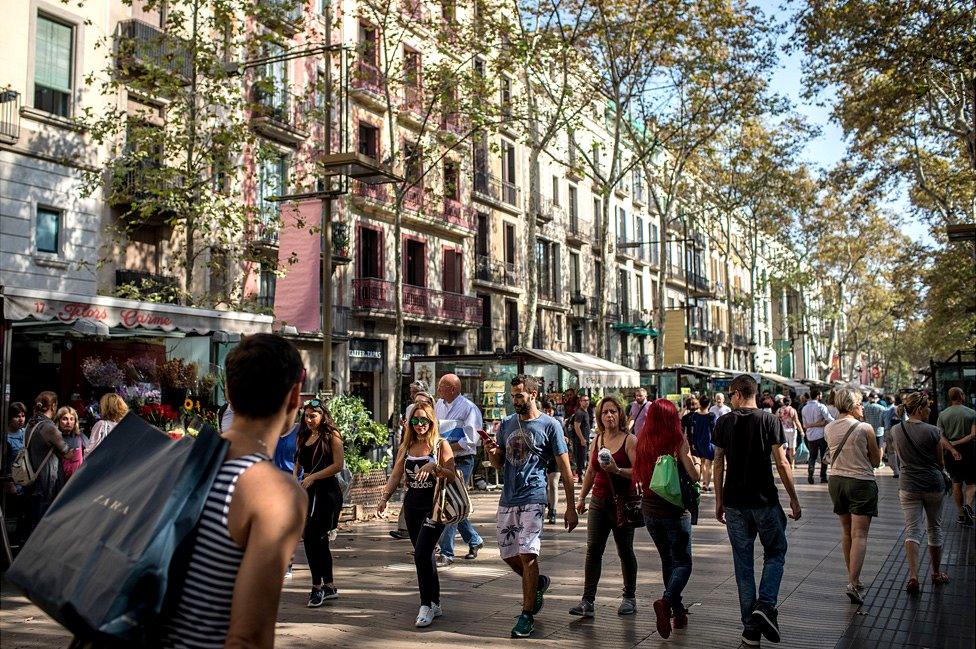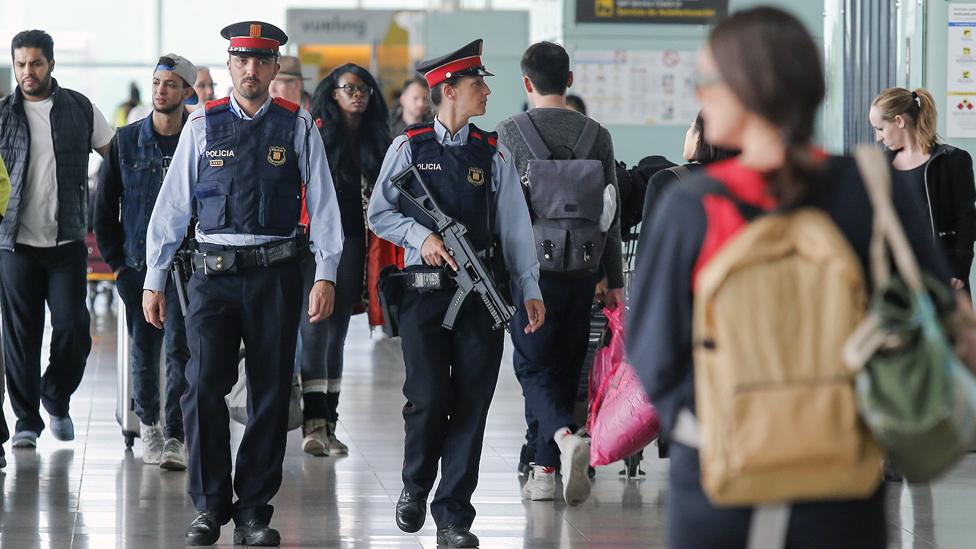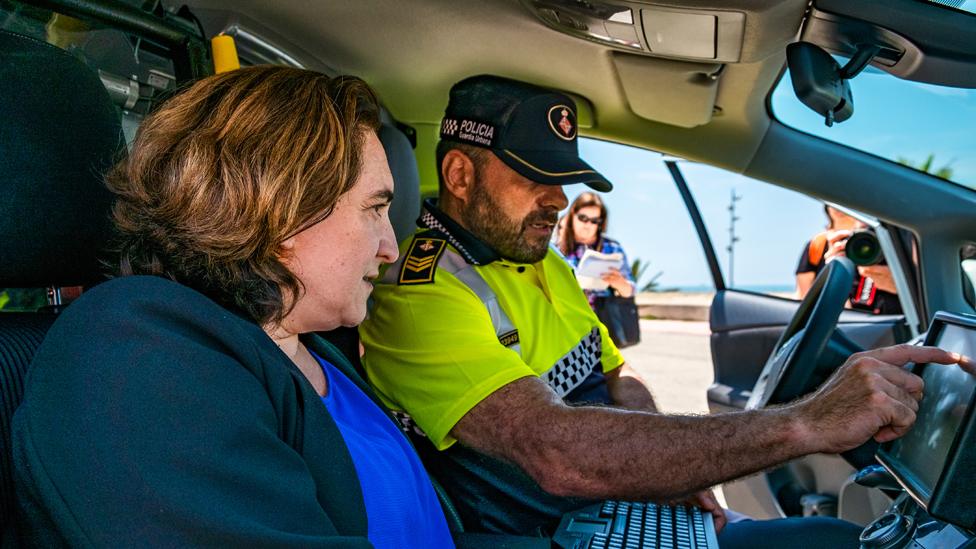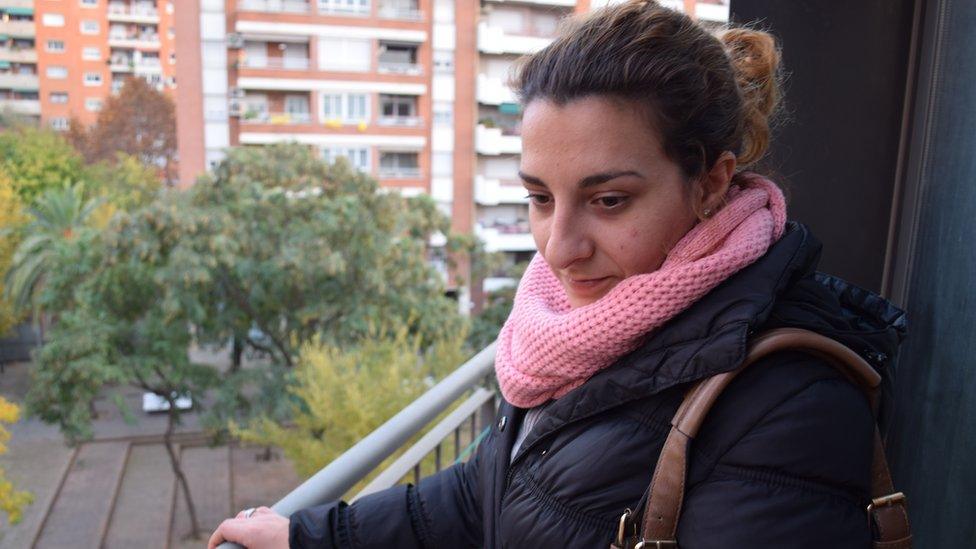Barcelona crime wave tarnishes boom in tourism
- Published

Pickpockets have long been a problem in Las Ramblas - a popular tourist haunt
Several violent robberies, including the mugging of a foreign diplomat, have drawn attention to a wave of crime in Barcelona that is alarming residents and the local authorities.
The Afghan ambassador in Spain, Humayoon Rasaw, was robbed on Sunday night in central Barcelona, when several assailants threw him to the ground and took his watch. Mr Rasaw suffered a leg injury in the attack.
A few blocks away, also on Sunday night, a 91-year-old French woman suffered head injuries when thieves grabbed her necklace.
Meanwhile, a German tourist was treated in hospital after being mugged two days earlier in the same area.
Barcelona city hall's head of security, Albert Batlle, has described the situation as "a crime crisis", and statistics seem to confirm that this trend began well before the summer.
Overall, crimes increased by 9% during the first six months of this year, compared with the same period in 2018.
Violent crimes were up 31% over the same period (with a rise of nearly 60% over the last three years), while robberies with force against businesses were up 66%.
'Out of control'
"It's time to admit the situation is out of control," said Luis Sans, president of an association representing businesses on the Passeig de Gràcia, a major street running through central Barcelona.
But while the authorities and the police acknowledge that the Catalan capital is struggling to cope with this trend, they do not see one clear cause driving it.

The Catalan government has agreed to step up police patrols in Barcelona
A city of 1.6 million residents, Barcelona drew 16 million visitors last year. Pickpockets and other petty criminals have long been operating in tourist-heavy areas such as the Ramblas boulevard and the Ciutat Vella neighbourhood that surrounds it.
Read more on Barcelona:
An official at city hall says that the rise in crime in the city is "a collateral effect" of Barcelona's meteoric rise as a tourist hub since it hosted the 1992 Olympic Games.
Yet the crime wave has also been attributed to the Spanish legal system. Courts' interpretation of a 2015 reform of the penal code means that first-time petty criminals rarely go to prison and even those caught reoffending will often pay a fine rather than going to jail, if they steal items worth less than €400 (£367).
"The legislative and judicial powers are not managing to provide a response to a specific problem in our society: repeated theft," Andrés Maluelda, of the law firm Molins, told El Periódico newspaper. The current legal framework, he said, offers a degree of impunity to professional thieves.
Political wrangling
Others are blaming the presence of unaccompanied immigrant minors in the city.
Alberto Fernández of the conservative Popular Party (PP) said earlier this year that 80% of these children, who are mainly from Morocco, "end up in criminal circles and undermine coexistence" in the neighbourhoods where they live.
Statistics supporting Mr Fernández's claim do not appear to be available and city hall, led by the leftist mayor Ada Colau, says no such link should be made.
"The presence of these unaccompanied minors in Barcelona is a social problem," says a city hall source. "[But] we never associate their presence here with the increase in crime."

Mayor Ada Colau (L) insists she is addressing the crime problem
Although the political opposition has accused Ms Colau of being soft on crime, she has boosted the city's security budget. Last year funding to fight crime increased by 16%, according to official figures, followed by a rise of 11% in this year's budget.
Also, the Catalan regional government has agreed to deploy 300 extra police to the city in September, following a plea from city hall, which said it lacked officers on the street.
Besides thefts, an upsurge in violent deaths in recent months is also a concern. In June, a South Korean woman who was visiting Barcelona with a government delegation died from a head injury after falling when a thief grabbed her purse.
Such incidents have brought bad publicity to a city loved for its sunshine, beaches, bars and monuments.
But its head of security insists the problem should not be exaggerated. "Barcelona is still a safe city in comparison with others, like Paris, London or Rome," said Mr Batlle.
"This is a big, complex city and there are many factors at play," said a spokesperson for the Catalan police, pointing out that the force had increased its arrest rate in a bid to stem the rise in crime. "We don't believe there is one cause behind all this."
- Published12 December 2015
